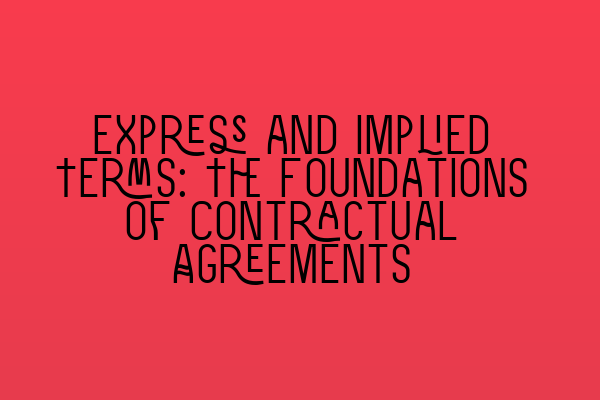Express and Implied Terms: The Foundations of Contractual Agreements
When it comes to contract law, the terms of an agreement are of utmost importance. They define the rights, obligations, and responsibilities of each party involved. Understanding the difference between express and implied terms is crucial for anyone entering into a contract. In this article, we will explore the foundations of contractual agreements and shed light on the significance of both express and implied terms.
Express Terms: The Building Blocks
Express terms are the specific provisions that are explicitly agreed upon by the parties involved in a contract. These terms can be in writing, spoken, or even implied by custom or previous dealings between the parties. They are the building blocks of the contractual agreement and outline the exact nature of the rights and obligations of each party.
Express terms can be found in various forms within a contract document. They may include pricing details, delivery dates, warranty clauses, payment terms, etc. These terms are essential for the clarity and certainty of the agreement as they leave no room for interpretation or dispute.
However, it is important to note that for terms to be considered express, they must have been communicated, mentioned, or written explicitly in the contract. Assumptions or expectations that have not been clearly expressed may not be considered as express terms and can lead to confusion or potential disputes in the future.
To ensure that express terms are effectively incorporated into a contract, it is advisable to have a written agreement that clearly outlines all the agreed-upon provisions. This not only helps in avoiding misunderstandings but also serves as crucial evidence in case of any legal disputes that may arise.
Implied Terms: The Unspoken Understandings
While express terms form the explicit foundation of a contract, implied terms are the unspoken understandings that are not expressly mentioned but are still binding on both parties. These terms are implied by law, custom, or the specific circumstances surrounding the contract.
Implied terms are not explicitly agreed upon by the parties, but they are considered necessary in order to give effect to the intention of the parties and make the contract workable. They fill in the gaps and provide necessary obligations or protections that are not explicitly stated in the contract itself.
There are different types of implied terms, including terms implied by common law, terms implied by statute, and terms implied by custom or trade usage. These terms add fairness, reasonableness, and functionality to the contract, ensuring that the agreement is practical and aligns with the parties’ intentions.
For example, when you purchase a product from a seller, there is an implied term that the product will be of satisfactory quality. This means that even if the quality is not explicitly mentioned in the contract, it is still expected that the seller will provide a product that meets reasonable quality standards.
It is important to note that implied terms may differ from one contract to another, depending on the nature of the transaction, the industry, and other relevant factors. Therefore, it is crucial to have a good understanding of the applicable law and industry practices to ensure that all necessary implied terms are considered and accounted for in the contract.
The Significance of Express and Implied Terms
Both express and implied terms play a vital role in ensuring that contractual agreements are fair, reasonable, and effective. Express terms provide clarity and certainty, leaving no room for misinterpretation or ambiguity. They outline the specific rights, obligations, and responsibilities of each party.
On the other hand, implied terms add additional obligations and protections that are necessary for the contract to function as intended. They fill in the gaps and address situations and circumstances that may not have been explicitly foreseen or addressed in the express terms.
Understanding the significance of both express and implied terms is essential for anyone involved in contract law. By incorporating express terms into contracts and considering necessary implied terms, parties can avoid misunderstandings, disputes, and potential legal issues that can arise from unclear or incomplete agreements.
For further insights into contract law and related topics, we recommend reading the following articles:
- Exploring the Impact of Frustration on Contractual Obligations: Legal Insights
- Interpreting Contractual Clauses: Unlocking the Hidden Meanings
- Legal Aspects of Business Contracts: Key Considerations for Entrepreneurs
- SQE Contract Law vs. Traditional Qualifications: A Comparative Analysis
- Agreements in Contract Law: Understanding Its Various Types
By expanding your knowledge on these subjects, you will gain a deeper understanding of contractual agreements and be better equipped to navigate the complex world of contract law.
